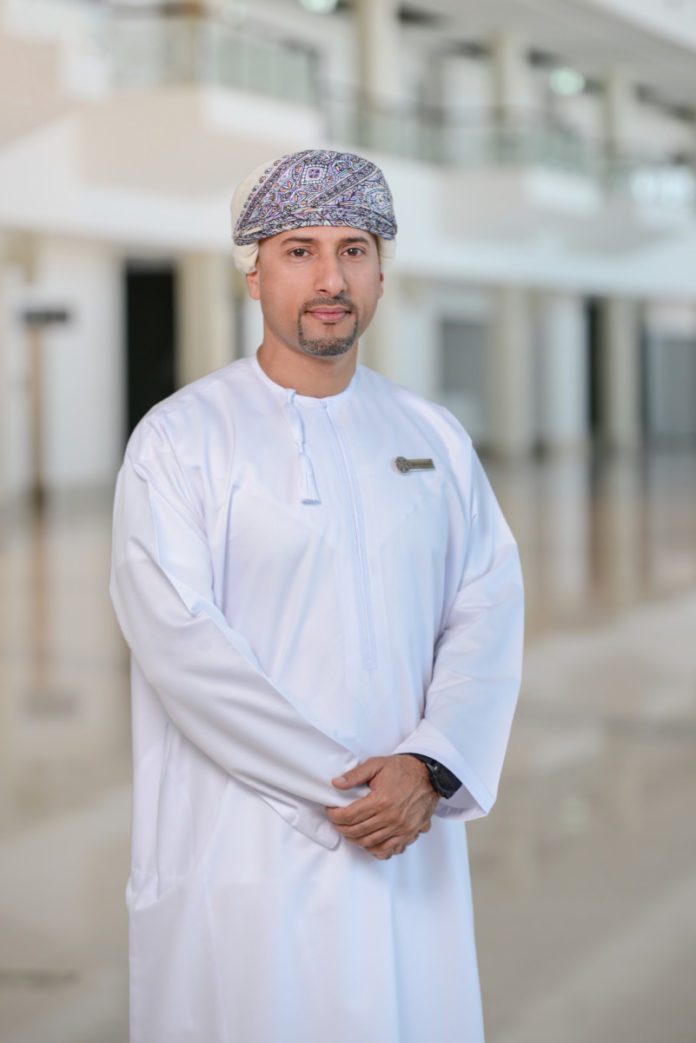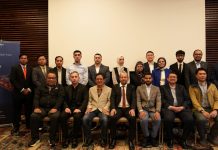Oman Convention & Exhibition Centre has elevated Oman’s stature as an international MICE destination. Said Salim Al Shanfari, CEO, talks about the iconic structure and its immense potential to boost Oman’s economic diversification strategy.
OCEC is expected to place Oman on the global business tourism map. Can you take us through the facilities inside the Centre?
The Oman Convention & Exhibition Centre (OCEC) is an iconic world-class venue which aims to change the face of business events in the Sultanate of Oman. Throughout the construction period, the design team worked in close collaboration with OMRAN, the Sultanate’s executive arm for tourism development, to deliver a world-class venue with state-of-the-art facilities suited to hosting the world’s biggest events.
The project was constructed and delivered in three different phases. Phase one focussed on civil work related to building work preparations; phase two introduced five column-less exhibition halls, two spacious and versatile ballrooms, a plug and play auditorium with 460 seats, 10 hospitality suites and five meeting rooms; and phase three unveiled an additional 15 meeting rooms, supporting facilities, and the jewel of the OCEC project – the Madinat Al Irfan theatre – which welcomes over 3200 visitors and can host a spectrum of shows and performances.
OCEC has a total exhibition and convention area of 100,000 square metres and is a future-proof venue – designed to be fully-adaptable to adopting future technologies and advancements. The venue has also been designed to allow for maximum customisation of the space which supports a full spectrum of event styles. The five exhibition halls feature 22,396 square metres of column-free exhibition space, while the centre features two-tiered auditoriums with a capacity to host 3,200 and 450 people, respectively. Hall 1 is commonly utilised as a multi-purpose space for plenary sessions, concerts, performances and gala dinners on a larger scale. However, combined with Hall 2, the space can accommodate over 10,000 in theatre-style seating. The centre also includes an additional 20 meeting rooms for 25-360 delegates, a grand ballroom which can host up to 1,200 guests in banquet style, a junior ballroom for up to 350 guests in banquet seating, and a VIP pavilion. In total, the centre offers over 55 meeting space options plus a multi-story car park with a capacity for 4,000 vehicles.
Aesthetically, OCEC is equipped with a blend of arabesque design, luxurious modern fixtures, personalised event services, the latest in communications and audio-visual technology and an authentic focus on Omani hospitality.
The recent opening of the JW Marriott Muscat will add another dimension to OCEC. What is the current status of the various hospitality and other projects within OCEC premises?
Madinat Al Irfan is the Sultanate’s largest urban development project, uniquely designed to create a commercial, residential and recreational hub in Muscat for residents, businesses and visitors. The integrated project provides a sophisticated level of hospitality and tourism infrastructure that supports OCEC’s function and boosts the Sultanate’s business events offerings.
The first hotel, Crowne Plaza OCEC, opened in 2017 with 296 well-appointed rooms and six dining outlets. Now – physically connected to OCEC via a walking bridge, and providing a 5-star option for guests – Oman’s first JW Marriott has opened. Designed as a luxury business hotel, JW Marriott Muscat offers 304 spacious rooms and suites, including a presidential suite, as well as five restaurants and lounges providing a range of delicious culinary experiences for guests. The next addition will be the 280-room economy Ibis Styles Muscat.
Together, the three hotels will constitute a total 1,000 rooms within walking distance from OCEC meaning we can support events with significant footfall and cater to budget sizes. With a further selection of other hotels within kilometers of the Madinat Al Irfan hub, Oman has never offered so much in the way of business and incentive tourism.
In regards to other projects, the nearby Business Park is making significant progress and is attracting the local private-sector and prospective investors. It already hosts the uniquely designed Omantel headquarters and there are more to come.
Tourism is one of the key industries identified in Oman’s diversification strategy. How is OCEC working with other stakeholders in the sector to promote Oman as a business events destination?
Business and incentive tourism are some of the fastest growing areas of the global tourism industry, putting OCEC in a position to contribute greatly to Oman’s 2040 strategy for economic diversification. Not to mention our location, 10 minutes from Muscat International Airport and just seven hours flight-time from 50 per cent of the world, we are perfectly positioned to offer a meeting spot for the world.
We work with other industry stakeholders, including OMRAN and the Ministry of Tourism, to develop integrated plans for business development and align on strategic direction. This is vital because it means we can formulate a holistic approach to development, that aligns with infrastructural and logistical developments in the nation. We also work closely with the Oman Convention Bureau to promote Oman around the world, both as a business events destination and a recreational tourism destination.
In terms of business events, we have partnered with several international exhibition organisers and industry associations, including ICCA, PCMA, AIPC and UFI. Through these partnerships, we are able to access international markets and remain fully-informed of industry developments. We also work with local organisers to understand their needs and challenges and adapt our services accordingly.
Oman is blessed with peace, natural beauty, a culture rooted in history, and a comforting hospitality that is embedded in the country’s traditions. We have built state-of-the-art airports, roads, hotels and other tourism infrastructure and we’re now at a stage where we’re working to ensure that the world knows what Oman has to offer.
Can you talk about some of the major international events and conventions that OCEC hosted so far and is going to host in 2020?
Since opening, we have hosted more than 450 events, including 50 international events such as the Airport Council International Conference and the second UNWTO/UNESCO World Conference on Tourism & Culture. In 2018, OCEC hosted the Royal Hospital Conference, the eighth Pharmaceutical Care Conference, the World Heavy Oil Congress and the IRU World Congress that welcomed more than 1,000 delegates to Oman from more than 100 countries. In 2019, we hosted the World Heavy Oil Congress and Exhibition with more than 1000 delegates.
Another major event was the 40th SICOT (Orthopaedic World Congress) in December 2019. The event welcomed over 2,500 members from 119 countries which saw half of Muscat’s hotels at full-capacity. The indirect spending from these events has a tremendous ability to generate economic growth and bolster the tourism ecosystem. In addition to hotel requirements, the events require use of airlines, restaurants, logistics companies, taxi drivers, tour guides and operators, etc.
In 2020, we are expected to host around 10 international events, including the World Cancer Congress (WCC) which will be held from October 20 to 22. It is the first time that the Congress is coming to the Middle East and it will bring nearly 4,000 attendees, comprising doctors as well as pharmaceutical and medical experts, to network and share knowledge. Registrations have already begun and we are anticipating a substantial demand on the Sultanate’s tourism facilities.
We are also hosting the 87th UFI Global Congress, the exhibition industry’s annual global gathering whose attendees include industry experts and business event tourism specialists. Attended by up to 700 people, UFI’s annual Global Congress is known as the exhibition industry’s largest global meeting of the year, combining international networking with unique content.
Securing events of this caliber is a testament to OCEC’s capacity to tackle large-scale and internationally-renowned events. The WCC can bring up to 4,000 people at one time which would equate to almost RO10mn in indirect spending to the overall tourism value chain. There is also an almost 75 per cent chance that the event attendees will return to Oman for future tourism ventures, generating further income for the Sultanate.
How successful has been your strategy to introduce more SMEs to OCEC eco system?
One of the main pillars of our strategy is to support SMEs and local businesses and, in the past year, we have been able to introduce more SMEs to our ecosystem. Currently, we have more than 10 SMEs working with us and we are looking to partner with more in the future. As a part of our commitment to national talent development, we provide SMEs with an incubation programme that introduces our venue and the scale of our operations and facilitates their learning curve for large-scale projects.
We partner with local SMEs for a wide range of services and always consider how we can utilize local talent in other areas. One of the companies we use, who provide innovative transportation services, are now working on long-term projects with us after completing a successful trial period. We also work with a local carpeting company who had a similar journey and have developed enough to support larger-scale projects now. Further SME partnerships support our operations in catering, and media and marketing services.
How sustainable is your project?
Sustainability is an important focus area for OCEC and we are the Sultanate’s first tourism development project to achieve a LEED Gold certification from the United States Green Building Council (USGBC).
The venue is built to the highest standards of sustainable design, incorporating advanced technologies and materials into every part of the project. The sustainable design helps to reduce the use of electricity, and we use solar panels for heating water. Additionally, our energy system can actually support not just the OCEC venue itself, but the entire Madinat Al Irfan precinct.
We are also introducing a lot of plastic-free alternatives and continue to raise awareness internally about the need for conscious, sustainable choices in the workplace. It is mandatory if we are to sustain our beautiful nation and allow future generations to prosper.
What are the measures taken by OCEC to build skilled and trained national resources in the tourism sector?
At OCEC, we are focused on creating a team that is skilled, resourceful, adaptable, and industry-aware. In order to achieve this, we offer a variety of different training programmes and career development opportunities. We recently introduced a one-year event management degree (EMD) in association with UFI. Currently, we have over 50 students graduating from this diploma and five of those students are employees of OCEC.
We have also collaborated with educational institutions, such as Sultan Qaboos University and Oman Tourism College, to provide their graduates with pathways into the workforce and opportunities for developing job-intensive, industry-focussed skills.
Further, we’ve teamed up with Brussels-based International School of Protocol & Diplomacy (ISPD) to bring international training expertise to Oman and create the relevant skillsets beneficial, not only to the OCEC, but to the entire tourism sector.






